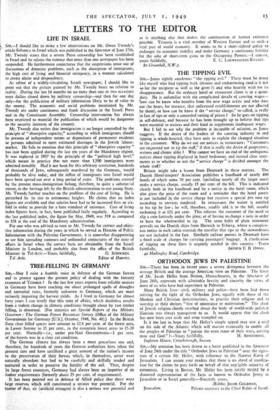THE TIPPING EVIL
StR,—Janus rightly condemns " the tipping evil." There must be many like myself who find tipping both irksome and embarrassing (and is it not so for the recipient as well as the giver ?) and who heartily wish for its disappearance. But the ordinary hotel or restaurant client is in a quan- dary. He is unfamiliar with the complicated details of catering wages— 'how can he know who benefits from the new wage scales and who does not (he hears, for instance, that unlicensed establishments arc not affected by them), or how can he know if the " service charge," so-called, is really in lieu of tips or only a concealed raising of prices ? So he goes on tipping in self-defence, and because he has been brought up to believe that tips were essential to waiters and their kind to supplement inadequate wages.
But I fail to see why the problem is incapable of solution, as Janus suggests. If the desire of the leaders of the catering industry to end tipping is whole-hearted, they have only to explain the changed situation to the customer. Why do we not see notices in restaurants: "Customers arc requested not to tip the staff," if that is really the desire of proprietors, waiters and clients alike ? Why cannot we have an end of the ambiguous notices about tipping displayed in hotel bedrooms, and instead clear state- ments as to whether or not the "service charge" is divided amongst the whole staff?
Britain might take a lesson from Denmark in these matters. The Danish Hotel-keepers' Association publishes a handbook of nearly 400 hotels of which some 70 per cent. (including nearly all the larger ones) make a service charge, usually 15 per cent. of the bill. This is indicated clearly both in the handbook and by a notice in the hotel room, which also gives the price of the room and a reminder that the hotel porter is not included in the service charge but receives a special pro ram tip according to services rendered. In restaurants the waiter is entitled to his tip by law ; he will, therefore, readily add it to the bill, usually reckoning it at 121 per cent. This relieves the customer of the need to slip a coin furtively under the plate, or of having to change a note in order to have the wherewithal to tip. The same habit of plain statement prevails on the Danish ships from Harwich to Esbjerg, where a conspicu- ous notice in each cabin reminds the traveller that tips to the stewardesses are not included in the fare. Similarly railway porters in Denmark have a fixed scale of charges for carrying passengers' baggage. A clarification of tipping on these lines is urgently needed in this country.- Yours






































 Previous page
Previous page